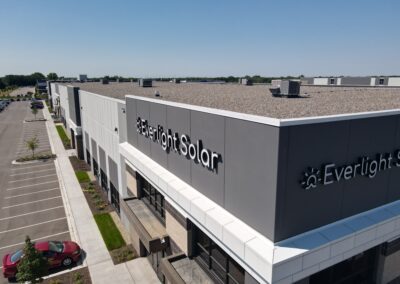Panel efficiency Today
Nowadays, most solar panels are between 15% and 20% efficient, with outliers on either end of the spectrum. In some situations, high-efficiency solar panels can exceed 22 percent efficiency (and even reach 23 percent). However, most photovoltaic panels on the market are around 20 percent efficient. Higher efficiency panels are more expensive, but they will help you meet your energy needs, especially if your roof space is restricted by size! Solar panels now provide more than enough usable electricity for most commercial and residential properties.
PHOTOVOLTAICS
Photovoltaic, or PV, technology transforms sunlight into electricity and is the industry standard for solar electric systems. Panels are made of many solar cells linked to form a module.
Each panel is frequently linked together in a system that sends electricity to an inverter, which converts it into the power needed to power household appliances. The efficiency of a panel is determined by its design and how its construction catches various frequencies of light energy.
Is it Possible for Solar Panels to Work in the Rain and Snow?
Even under heavy weather conditions, such as rain, snow, and wind, solar panels generate electricity. While solar panels work best in direct sunlight, they can also create power because of diffuse solar or indirect sunlight.
Despite the fact that energy production falls when cloud cover thickens, solar panels continue to operate at a higher capacity than one might assume. Rain also aids in the removal of dust from solar panels, allowing them to operate more efficiently.
During periods of heavy snowfall, the black, reflecting glass of solar panels increases snowmelt, allowing it to slide off before interfering with performance. Rooftop solar panels are often angled up at 30 to 45 degrees, which helps prevent snow accumulation to some extent. A little dusting of snow, on the other hand, is likely to fly away or disappear quickly.
Snow from the ground can reflect extra sunlight onto your solar panels like a mirror on cold, clear days. In the cold, this “albedo effect” allows panels to produce significantly more electricity.
Improvement Throughout the years
Researchers are constantly working to increase solar technology efficiency. Using better cells that are adjusted to collect different frequencies of light on the electromagnetic spectrum, scientists have now achieved a record of 40% efficiency. Although these are the most efficient solar cells yet developed, they are not yet available to the general public.
A more efficient solar panel may be the appropriate solution for you if you have a smaller roof and limited space. These panels may be slightly more expensive because of their increased efficiency, but they will still meet your energy needs.
Taking into account the entire cost of the panels as well as their kilowatt output might assist you in determining which is optimal for your installation.
How Everlight can help
Everlight Solar’s goal is to install high-efficiency panels that use the least amount of energy possible. We are always researching new solar technologies to improve the production and efficiency of our goods. We can assist you in determining the best model for your project.
Get in contact with an Everlight Solar expert for additional information here.




